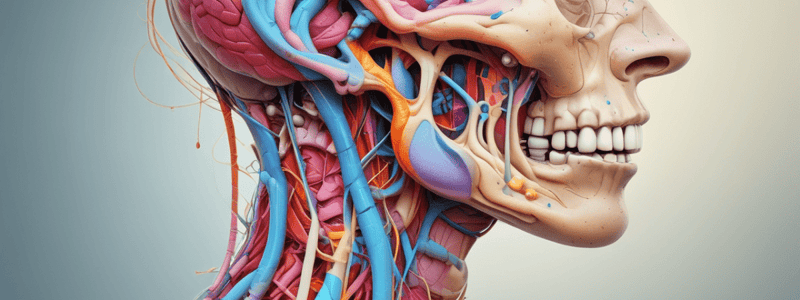Podcast
Questions and Answers
What is the purpose of studying head and neck embryology?
What is the purpose of studying head and neck embryology?
- To learn about the basic principles of embryonic development
- To understand the development of the pharyngeal arches
- To explore common disorders related to head and neck development
- All of the above (correct)
Which germ cell layer gives rise to the innermost layer of the body?
Which germ cell layer gives rise to the innermost layer of the body?
- Ectoderm
- Mesoderm
- Endoderm (correct)
- None of the above
What is the main feature of the pharyngeal arches?
What is the main feature of the pharyngeal arches?
- They are separated by clefts
- They are formed by growth of mesenchymal tissue
- They are located in the cranial region of the embryo
- All of the above (correct)
Which pharyngeal cleft gives rise to a permanent structure in the adult?
Which pharyngeal cleft gives rise to a permanent structure in the adult?
What happens to the 2nd, 3rd, and 4th pharyngeal clefts?
What happens to the 2nd, 3rd, and 4th pharyngeal clefts?
What is the main role of the cranial nerves in head and neck development?
What is the main role of the cranial nerves in head and neck development?
How many pairs of pharyngeal pouches are there?
How many pairs of pharyngeal pouches are there?
Which week does the development of the face complete?
Which week does the development of the face complete?
What is the initial structure that appears at the site of the future face during the 3rd week?
What is the initial structure that appears at the site of the future face during the 3rd week?
Between which weeks does the palate begin to develop?
Between which weeks does the palate begin to develop?
What happens to the tongue during palate development?
What happens to the tongue during palate development?
With what structures do the palatal shelves fuse to form the secondary palate?
With what structures do the palatal shelves fuse to form the secondary palate?
During which week of gestation does tongue development begin?
During which week of gestation does tongue development begin?
Which pharyngeal arches contribute to the formation of the tongue mucosa?
Which pharyngeal arches contribute to the formation of the tongue mucosa?
What process releases the tongue from being tethered to the floor of the oral cavity?
What process releases the tongue from being tethered to the floor of the oral cavity?
By which week are all cranial nerve nuclei present?
By which week are all cranial nerve nuclei present?
Which cranial nerves arise from the rhombomeres produced by neuroepithelium?
Which cranial nerves arise from the rhombomeres produced by neuroepithelium?
What condition occurs when the pharyngeal clefts are not obliterated by the second pharyngeal arch?
What condition occurs when the pharyngeal clefts are not obliterated by the second pharyngeal arch?
Flashcards are hidden until you start studying
Study Notes
Embryonic Development
- The development of the head and neck begins in the 4th and 5th week of gestation
- Growth of mesenchymal tissue in the cranial region results in the formation of arches separated by clefts, known as pharyngeal arches and pharyngeal clefts
Pharyngeal Arches
- Initially, there are four pharyngeal arches, separated by pharyngeal clefts
- Only the 1st cleft gives rise to a permanent structure in the adult, the external auditory meatus
- The 2nd, 3rd, and 4th clefts form temporary cervical sinuses that are later obliterated by the rapidly proliferating 2nd pharyngeal arch
Pharyngeal Pouches
- Pharyngeal pouches separate pharyngeal arches on the inner (endodermal) surface
- There are five pairs of pouches, but only four give rise to structures in the adult
Face Development
- The external human face develops between the 4th and 6th week of embryonic development
- The development of the face is completed by the 6th week
- An oropharyngeal membrane appears at the site of the future face during week 3 of embryonic development
- The oropharyngeal membrane breaks down to form the future oral cavity by the 4th week
Palate Development
- The palate begins to develop between the 6th and 8th week
- The maxillary prominences expand medially to give rise to the palatal shelves
- The palatal shelves fuse with each other in the horizontal plane and with the nasal septum in the vertical plane to form the secondary palate
- The development of the palate is completed by the 12th week
Tongue Development
- The tongue begins development in the 4th week of gestation
- The tongue is derived from pharyngeal arches 1-4 (forms the mucosa of the tongue) and the occipital somites (forms the musculature of the tongue)
- A process of sculpting apoptosis releases the tongue from the floor of the oral cavity, leaving the lingual frenulum to anchor the tongue in the mouth
Cranial Nerve Development
- The nuclei of all cranial nerves are present by week 4
- All cranial nerves arise from the hindbrain except olfactory and optic
- Motor nuclei derived from rhombomeres produced by neuroepithelium gives rise to motor nuclei of cranial nerves 4, 5, 6, 7, 9, 10, 11, and 12
- Cranial nerve sensory ganglia originate from neural crest cells and ectodermal placodes
Clinical Relevance
- Cleft lip and cleft palate occur when the medial nasal prominence and maxillary prominence fail to fuse
- Branchial cysts occur when pharyngeal clefts are not obliterated by the 2nd pharyngeal arch
- Thyroglossal duct is an epithelialized tract that connects the thyroid gland to the foramen cecum of the tongue
Studying That Suits You
Use AI to generate personalized quizzes and flashcards to suit your learning preferences.




